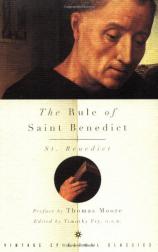Reading Group Guide
Discussion Questions
The Rule of Saint Benedict

1. The explicit purpose of Benedict's Rule was to teach monks and their superiors how to live the monastic life. Today, nonmonastic readers approach the Rule in order to think about changing their lives. How does such a guidebook compare to bestselling books of counsel like Julia Cameron's The Artist's Way or Stephen R. Covey's The Seven Habits of Highly Effective People? How would you compare the underlying assumptions of today's self-help culture with those of Benedict's philosophy?
2. Benedict places great emphasis on the importance of silence and solitude as well as the importance of the community setting. How do you understand the importance of silence and solitude? How do we learn to become comfortable with silence, and with being more thoughtful and sparing in our use of words? How does Benedict suggest we go about trying to hear the word of God in silence?
3. Norvene Vest has written, "The key to Benedictine spirituality lies in the word 'ordinary.' Benedict insists that no moment is too small for nearness to God. Life in Christ does not necessarily involve something dramatic or heroic. It may simply engage the everyday stuff of my lifeÉ.Whatever my present circumstances, Christ will meet me there."1 She also points out that Benedict's emphasis is not so much on renunciation, as an attentiveness to what we are given. Is there a sense of relief in the realization that God doesn't require the impossible? If you have read THE DESERT FATHERS, how does this concept of the "ordinary" compare to their approach to the spiritual life?
4. What roles do prayer, communal praise (through the singing of the psalms), manual work, and holy reading play in Benedict's approach to God? How, living outside a monastic setting, might you begin to integrate the various parts of the Benedictine way? How might the order and discipline of monastic life be adapted to a busy, worldly, secular life? Notice that we are told, "It is called a rule because it regulates the lives of those who obey it" [p. 7]; does bringing a deliberate sense of order to the ordinary tasks of each day free the mind to contemplate the things of the spirit?
5. Benedict exhorts his readers to "Live in fear of judgment day and have a great horror of hell. Yearn for everlasting life with holy desire" [p. 13]. The concept of hell is more foreign, less visceral and immediate, to those of us who live in a secular society than it was for Christians in Benedict's time. What is your idea of hell? Has the concept of hell in today's world been replaced simply by a fear of death? What is your notion of a punishment that is an incentive to change one's life?
6. What is your response to Benedict's instructions on "The Tools for Good Works"? Notice that much of Benedict's counsel is taken directly from the Gospels and Epistles. What is the Benedictine approach to the opposition between the flesh and the spirit? How important is the concept of physical discipline? How do you interpret Benedict's statement on behavior: "Your way of acting should be different from the world's way; the love of Christ must come before all else" [p. 12]?
The Rule of Saint Benedict
- Publication Date: March 24, 1998
- Genres: Religion, Religion & Spirituality, Religious Studies
- Paperback: 112 pages
- Publisher: Vintage
- ISBN-10: 037570017X
- ISBN-13: 9780375700170






